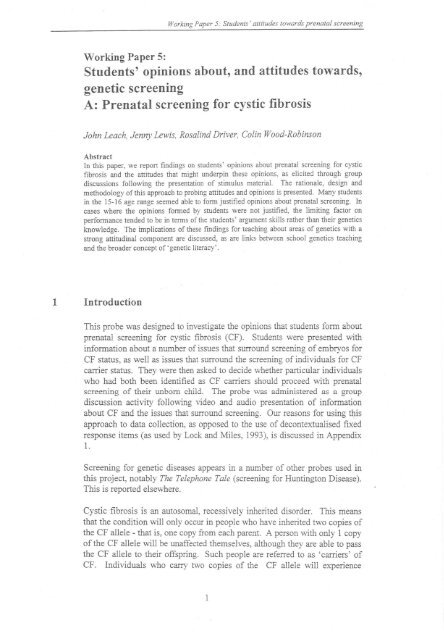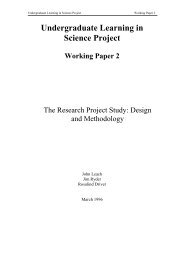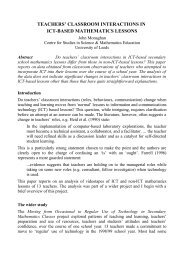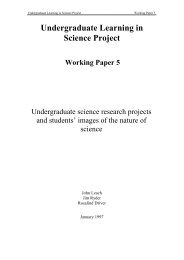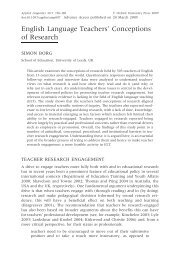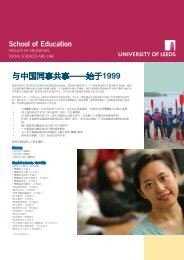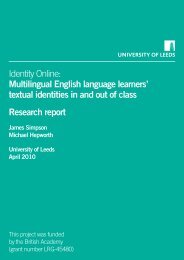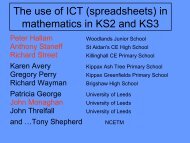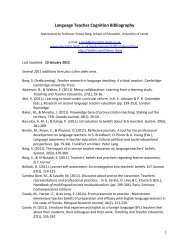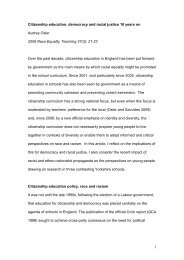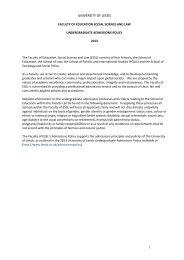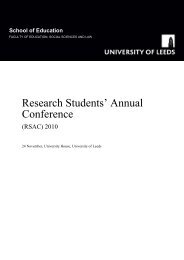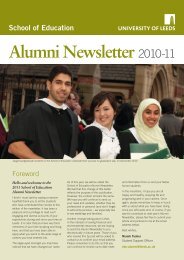Opinions On And Attitudes Towards Genetic Screening - School of ...
Opinions On And Attitudes Towards Genetic Screening - School of ...
Opinions On And Attitudes Towards Genetic Screening - School of ...
- No tags were found...
You also want an ePaper? Increase the reach of your titles
YUMPU automatically turns print PDFs into web optimized ePapers that Google loves.
Working Paper 5: Students' attitudes towards prenatal screeningWorking Paper 5:Students' opinions about, and attitudes towards,genetic screeningA: Prenatal screening for cystic fibrosisJohn Leach, Jenny Lewis, Rosalind Driver, Colin Wood-RobinsonAbstractIn this paper, we report findings on students' opinions about prenatal screening for cysticfibrosis and the attitudes that might underpin these opinions, as elicited through groupdiscussions following the presentation <strong>of</strong> stimulus material. The rationale, design andmethodology <strong>of</strong>this approach to probing attitudes and opinions is presented. Many studentsin the 15-16 age range seemed able to form justified opinions about prenatal screening. Incases where the opinions formed by students were not justified, the limiting factor onperformance tended to be in terms <strong>of</strong> the students' argument skills rather than their geneticsknowledge. The implications <strong>of</strong> these findings for teaching about areas <strong>of</strong> genetics with astrong attitudinal component are discussed, as are links between school genetics teachingand the broader concept <strong>of</strong> 'genetic literacy' .1 IntroductionThis probe was designed to investigate the opinions that students form aboutprenatal screening for cystic fibrosis (CF). Students were presented withinformation about a number <strong>of</strong> issues that surround screening <strong>of</strong> embryos forCF status, as well as issues that surround the screening <strong>of</strong> individuals for CFcarrier status. They were then asked to decide whether particular individualswho had both been identified as CF carriers should proceed with prenatalscreening <strong>of</strong> their unborn child. The probe was administered as a groupdiscussion activity following video and audio presentation <strong>of</strong> informationabout CF and the issues that surround screening. Our reasons for using thisapproach to data collection, as opposed to the use <strong>of</strong> decontextualised fixedresponse items (as used by Lock and Miles, 1993), is discussed in Appendix1.<strong>Screening</strong> for genetic diseases appears in a number <strong>of</strong> other probes used inthis project, notably The Telephone Tale (screening for Huntington Disease).This is reported elsewhere.Cystic fibrosis is an autosomal, recessively inherited disorder. This meansthat the condition will only occur in people who have inherited two copies <strong>of</strong>the CF allele - that is, one copy from each parent. A person with only 1 copy<strong>of</strong>the CF allele will be unaffected themselves, although they are able to passthe CF allele to their <strong>of</strong>fspring. Such people are referred to as 'carriers' <strong>of</strong>CF. Individuals who carry two copies <strong>of</strong> the CF allele will experience1


